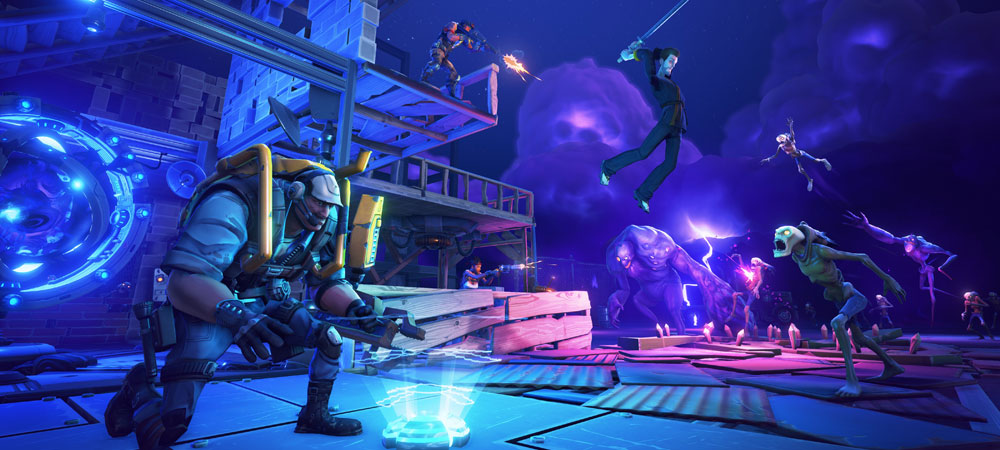Epic Games has been off building something great
When Epic first announced Fortnite, I was on board based on the premise of defending player-made forts from monsters. But that was a couple of years ago. Things change.
My interest had been waning up until recently, when I got to spend two hours with the “action building” game during PAX Prime. Mechanically, it’s like a mix of the third-person shooting and trap-laying defense of Orcs Must Die! with the scavenging and construction of Minecraft.
Pretty damn good combination, then.

The setup here is that the “world has gone through some shit,” according to lead animator Matt Russell. Where there are storms, there are monsters, and there’s been a hell of a lot of storms lately. But you aren’t surviving in this ravaged world — you’re actually thriving in it.
For our demo, my four-person group got to play through a few levels, each of which started us off in a procedurally-generated landscape. One had a farm, another, an abandoned town. In every case, the mission was simple: break everything in sight for resources, at least initially.
Cars, brick walls, trees, treasure chests — you name it, we smashed it out of existence.
Essentially all but the terrain itself can be harvested. This tends to be a rather mundane activity in games, but I liked it here thanks to a mechanic in which weak-point notifications appear on objects at random while you’re smacking them. For as simple of a solution as it is, it just feels right, and there’s the added benefit of keeping your items around longer since durability is a concern.
All of this resource gathering is crucial for crafting weapons and laying down defensive structures, but I’ll get to that later. We had our pick of three classes: the commando, ninja, and constructor. These are geared toward shooting, melee, and building, respectively, but all of the classes can use any weapon or make any type of building — they just aren’t proficient at everything.
The key differences come about through inherent skills (and those added by way of skill tree upgrades) which make certain classes better suited to, say, wielding a sword. In the case of the constructor, he’s the only character who can upgrade structures to their max level.
Our crew ended up with three ninjas and a constructor and while that wasn’t a total disaster, it’s probably best that you roll with a more well-rounded group. That said, the ninja was a blast given his double-jump ability and lightning-quick sword swings — much more fun in practice than he’s looked in some of the recent Fortnite trailers, that’s for sure.

After finding enough gear and resources in the environment, the time came to prepare for defense. One level had us searching for a blue sphere, which was connected to the storms — we needed to close it. After placing a device on said sphere, we could then build around it.
Monsters will come out of the woodwork to prevent you from messing with their storms, but not until you activate the closure gadget, leaving plenty of time to get your fort situated. We threw down floors, walls, staircases, traps, and more to keep the mutants away.
The construction aspect of Fortnite is one of those things that’s best experienced yourself — words don’t do it enough justice — but I will say it’s among the most intuitive I’ve seen.
Pieces snap together simply, and creating doors and windows is as easy as punching out holes in an existing wall. This is all meant to be fast enough that it’s feasible to continue building even when you’re in the chaos of an all-out assault on your defenses. And Fortnite will get chaotic.

While there were a couple variations on the mission type I just described, everything we played inevitably involved defending something or other from the monsters. This started out easy when it was only basic foes, but things spiraled out of control once giants, beehive-headed mutants, and tank-like enemies who could throw smaller monsters started showing up.
Even with four people on your team, it still feels like you’re running damage control, scraping to get by. I’m afraid to think of how challenging later levels will surely get.
In a world where paid alphas are an everyday occurrence, I’m surprised Epic isn’t putting Fortnite out in front of more people — it’s loads of fun, even in its current state.
Still, there’s plenty of important stuff we weren’t shown, from the overarching Home Base features to how monetization will be handled. It’s a good sign that after playing for two hours I didn’t want to stop, but if this game is going to be the long-running hit that Epic hopes it’ll be, it’s for the best that the company takes its time to get everything right. So far so good on that front.


